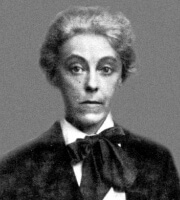About Charlotte Mew
Charlotte Mew ( 15 November 1869 – 24 March 1928 ) was an English poet and writer of smoldering intensities of the Victorian era. Like Thomas Hardy, who considered her “far and away the best living woman poet,” Mew was metrically adventurous and outwardly traditional, partly a Victorian, partly a modernist. She is usually associated with the early-twentieth-century Georgian poets, whose name alludes to the reign of George V. However, since that group consisted almost exclusively of male poets, Mew is something of an outlier. Her irregular rhythms and rhyming free-verse experiments give her poems a different kind of offbeat energy. Her romantic focus on women also lends it a proto-feminist perspective. She wrote two books of poems, The Farmer’s Bride (1916) and The Rambling Sailor (1929), which appeared posthumously. She often used the dramatic monologue to give voice to her own feelings and experience under the guise of an assumed persona. Here is her poem “Rooms,” which is undated and may have been too revealing to publish in her lifetime.Mew began publishing in the 1890s.Her themes were drawn from her own life. Her poem “The Shade-Catchers” (1921), for instance, expresses her love of children—implicitly, those whom her renunciation of marriage has denied her. Catching shadows, the play that occupies a brother and sister, suggests the children—the “shadows” of themselves—who one day will be theirs: “‘I’ve got one’ . . . ‘I’ve got two.’ . . . ‘Now I’ve got another.’” Titled after the resting place of her insane brother, who died in 1901, “In Nunhead Cemetery” (1916) is narrated by a male speaker mourning the loss of his fiancée, who died one month short of their appointed wedding. The poem is painful: “Though I am damned for it we two will lie / And burn”—an image that, like the stillborn marriage, suggests the repression that dogged Mew.
Virginia Woolf regarded Mew as the finest female poet of her time.
Browse all poems and texts published on Charlotte Mew
According to the critic Val Warner, Mew’s work is “a [cry from the heart] against the meaninglessness of life, if all it means is suffering.”









